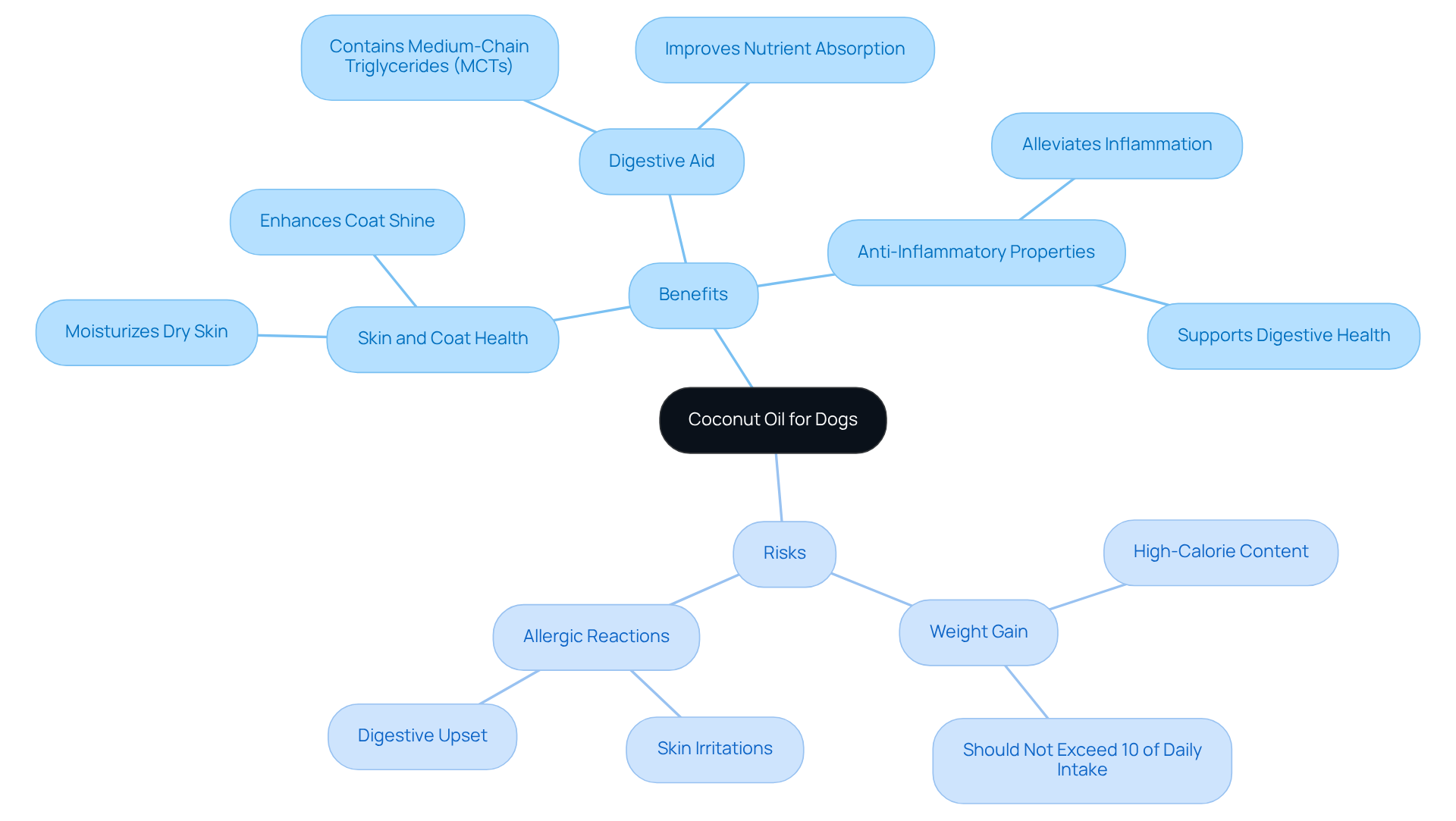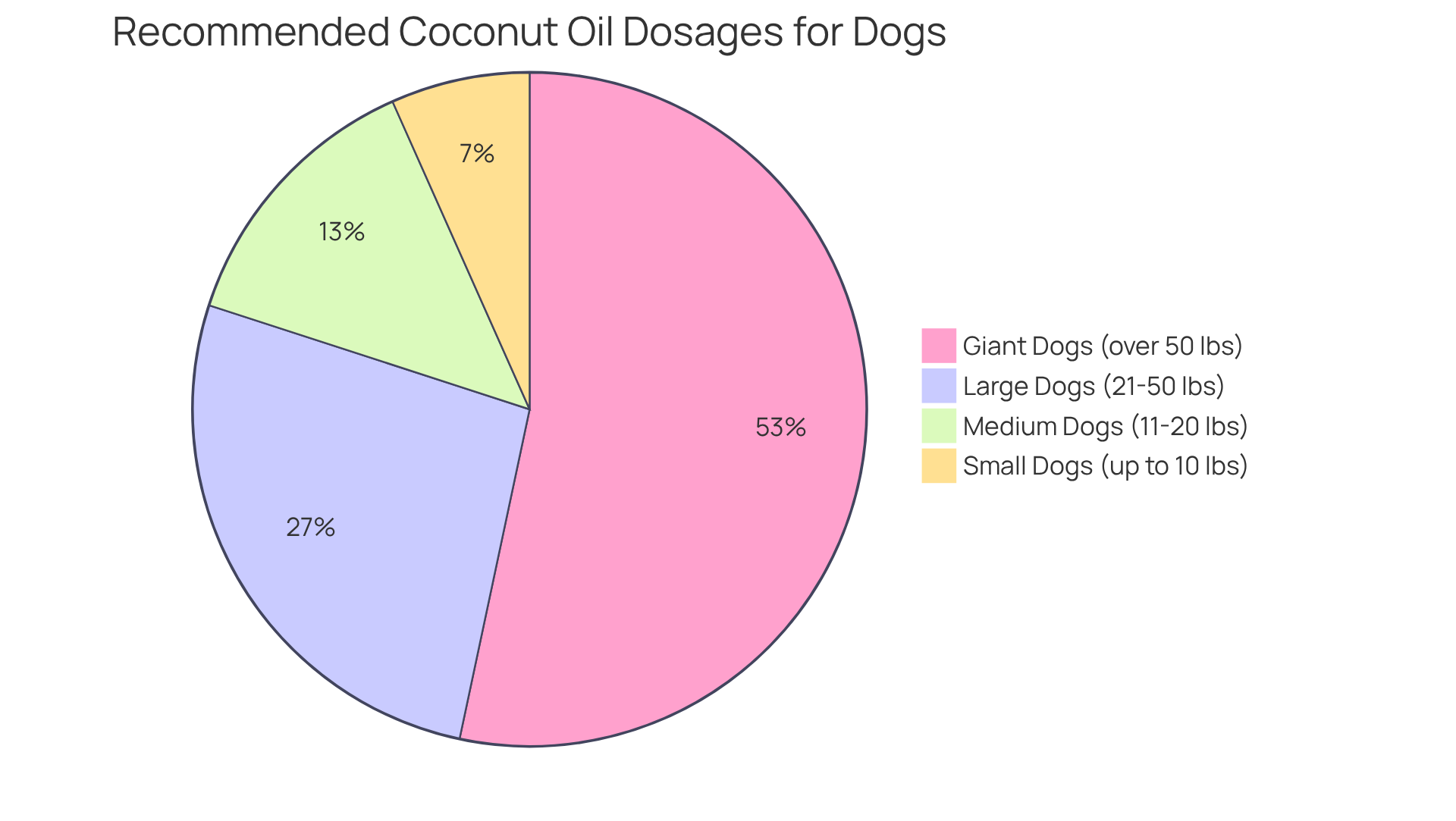Can Dogs Have Coconut Oil? Safe Dosage and Monitoring Tips
Overview
As a loving pet owner, you may wonder if coconut oil can be beneficial for your furry family members. The good news is that, in moderation, coconut oil can indeed provide several advantages, such as:
- Improved skin and coat health
- Digestive support
- Anti-inflammatory properties
However, it’s essential to monitor your dog’s intake, ensuring it does not exceed 10% of their daily caloric intake.
When introducing coconut oil to your pet’s diet, it’s best to do so gradually to avoid any digestive discomfort. Remember, your pet’s well-being is paramount, and consulting with a veterinarian can offer personalized advice tailored to your dog’s specific needs. This way, you can ensure a nurturing environment while keeping an eye out for any adverse reactions.
At Adventure Den, we understand how much you care for your pets. By incorporating coconut oil thoughtfully, you can enhance their health and happiness. So, take that step today—your furry companions deserve the best care possible!
Introduction
Coconut oil has become a beloved choice among pet owners, cherished for its potential to enhance the health and well-being of our furry family members. It offers numerous benefits, including improved skin and coat condition, as well as digestive support.
However, a pressing question arises: is it truly safe for dogs to consume coconut oil? While the advantages are certainly appealing, we must also consider the risks, such as weight gain and digestive issues, which are vital to acknowledge.
As caring dog owners navigate this important decision, understanding the proper dosage and closely monitoring their pet’s reactions is essential to ensure a nurturing and beneficial experience.
Understand the Benefits and Risks of Coconut Oil for Dogs
Coconut oil is often celebrated for its potential health benefits for our furry family members, leading many to ask, can dogs have coconut oil to enhance skin and coat health, aid digestion, and provide anti-inflammatory properties? However, it’s essential to remain mindful of the associated risks. This oil is calorie-dense and high in fat, which can lead to weight gain if not carefully monitored. It’s recommended that coconut oil should not exceed 10% of your dog’s daily caloric intake. Additionally, some dogs may experience digestive issues, like diarrhea or vomiting, particularly if coconut oil is introduced too quickly. Before determining if can dogs have coconut oil in their diet, consulting with a veterinarian is crucial to ensure it aligns with their unique wellness needs.
Benefits of Coconut Oil:
- Skin and Coat Health: Coconut oil can effectively moisturize dry skin and enhance the overall condition of your dog’s coat, promoting a healthy shine.
- Digestive Aid: It may assist digestion and improve nutrient absorption, especially in dogs with gastrointestinal concerns, prompting the question of whether can dogs have coconut oil. The medium-chain triglycerides (MCTs) in coconut oil raise the question of whether can dogs have coconut oil, as they are quickly metabolized, providing a rapid energy source and supporting digestive health. The MCTs found in coconut oil can help alleviate inflammation, raising the question of whether can dogs have coconut oil to benefit from its anti-inflammatory properties.
Risks of Coconut Oil:
- Weight Gain: Due to its high-calorie content, excessive use of coconut oil can lead to obesity, particularly in less active dogs. It is advised to consider how much coconut oil can dogs have, as it should not surpass 10% of a dog’s daily caloric consumption. When considering if can dogs have coconut oil, it’s important to note that introducing it too quickly can result in digestive upset, including gastrointestinal distress, diarrhea, or greasy stools. It’s best to start with small amounts and gradually increase the dosage.
- Allergic Reactions: Some dogs may have allergies to coconut oil, which can manifest as skin irritations or other adverse effects. It is vital to monitor your dog for any signs of discomfort to determine if can dogs have coconut oil.

Determine Safe Dosage and Administration Methods for Coconut Oil
When incorporating oil from palms into your dog’s diet, starting with a safe dosage is essential for your furry family members’ health and happiness. Here are some general guidelines to help you:
- Small Dogs (up to 10 lbs): Begin with 1/4 teaspoon per day.
- Medium Dogs (11-20 lbs): Start with 1/2 teaspoon per day.
- Large Dogs (21-50 lbs): Initiate with 1 teaspoon per day.
- Giant Dogs (over 50 lbs): Commence with 1 tablespoon per day.
Administration Methods:
- Combine with Meals: Incorporate palm oil into your dog’s usual dishes to disguise the flavor and enhance taste.
- Direct Feeding: Some dogs may enjoy licking the oil directly from a spoon.
- Topical Application: For skin issues, apply a small amount directly to the affected area, ensuring your dog does not lick it off immediately.
Gradual Introduction:
After a week of monitoring your dog’s reaction, you can gradually increase the dosage if no adverse effects are observed. It’s important to consult your veterinarian for personalized recommendations, especially since studies indicate that introducing oil too quickly can lead to digestive issues such as diarrhea or greasy stools. Additionally, palm oil contains around 40 calories per teaspoon, making it crucial to track your dog’s total calorie consumption to prevent weight gain. By following these guidelines, you can ensure a safe and beneficial experience for your beloved pet.

Monitor Your Dog’s Health and Reactions After Introducing Coconut Oil
After incorporating oil from coconuts into your dog’s diet, it’s essential to monitor their health vigilantly to see if can dogs have coconut oil. Here are some key aspects to observe:
Signs to Watch For:
- Digestive Issues: Keep an eye out for symptoms such as diarrhea, vomiting, or changes in appetite. If these occur, consider reducing the dosage or discontinuing use altogether. It’s important to note that excessive consumption of palm oil can lead to gastrointestinal disturbances, including pancreatitis, as highlighted by veterinary experts.
- Weight Changes: Regularly assess your dog’s weight to ensure they are not gaining excess pounds from the additional calories provided by coconut oil. As stated by the Association for Pet Obesity Prevention, 54% of U.S. dogs are overweight, which can lead to significant medical concerns. Maintaining a healthy weight is crucial for your furry family member’s overall well-being.
- Skin Reactions: Be vigilant for any signs of allergic reactions, including itching, redness, or swelling at the application site. Allergic responses can exacerbate existing skin conditions, making it vital to monitor your dog closely.
Regular Check-ups:
Schedule routine veterinary visits to discuss your dog’s diet and any health changes. Your veterinarian can provide personalized guidance based on your dog’s unique requirements and medical conditions, ensuring a thorough approach to their well-being. Dr. Jamie Whittenburg emphasizes the importance of consulting a veterinarian prior to incorporating oil into your dog’s routine, especially to determine if can dogs have coconut oil for their specific wellness needs.
Adjusting Dosage:
If your dog shows no adverse reactions, you may gradually increase the dosage. However, moderation is essential, and it’s always wise to consult your veterinarian if you have any concerns about your dog’s health or the effects of palm oil. Remember, coconut oil is not effective as a laxative for constipated dogs and can cause painful stomach upset if not administered carefully.

Conclusion
Coconut oil can offer your furry family members a variety of health benefits, including improved skin and coat health, digestive support, and anti-inflammatory properties. However, it’s essential to approach its use with caution. The high-fat content can lead to weight gain and digestive issues if not carefully monitored. By consulting with a veterinarian before introducing coconut oil into your dog’s diet, you can ensure that it aligns with their specific health needs.
This article highlights several key points:
- While coconut oil has the potential to moisturize dry skin and aid digestion, these benefits must be balanced against the risks, such as obesity and allergic reactions.
- Safe dosage guidelines are provided based on your dog’s size, emphasizing the importance of a gradual introduction and monitoring for any adverse effects.
- Regular veterinary check-ups and health assessments are vital to ensure that coconut oil remains a beneficial addition to your dog’s diet.
In conclusion, while coconut oil can be a valuable supplement for dogs, responsible usage is paramount. Pet owners should remain vigilant about their dog’s health, watch for any negative reactions, and adjust dosages as needed. By prioritizing your pet’s well-being and consulting with veterinary professionals, you can safely explore the benefits of coconut oil, enhancing the quality of life for your beloved companions.
Frequently Asked Questions
What are the benefits of coconut oil for dogs?
Coconut oil can moisturize dry skin, enhance the condition of a dog’s coat, aid digestion, improve nutrient absorption, and provide anti-inflammatory properties due to medium-chain triglycerides (MCTs).
How does coconut oil help with skin and coat health in dogs?
Coconut oil effectively moisturizes dry skin and promotes a healthy shine in a dog’s coat.
Can coconut oil assist with digestion in dogs?
Yes, coconut oil may assist digestion and improve nutrient absorption, particularly in dogs with gastrointestinal concerns.
What are the risks associated with giving coconut oil to dogs?
The risks include weight gain due to high-calorie content, potential digestive issues like diarrhea or vomiting if introduced too quickly, and possible allergic reactions manifesting as skin irritations.
How much coconut oil can dogs have safely?
Coconut oil should not exceed 10% of a dog’s daily caloric intake to prevent weight gain and other health issues.
What should I do before adding coconut oil to my dog’s diet?
It is crucial to consult with a veterinarian to ensure that coconut oil aligns with your dog’s unique wellness needs.
What signs should I look for if my dog has an allergic reaction to coconut oil?
Signs of an allergic reaction may include skin irritations or other adverse effects, and it’s important to monitor your dog for any discomfort.
How should I introduce coconut oil to my dog’s diet?
It’s best to start with small amounts of coconut oil and gradually increase the dosage to avoid digestive upset.







